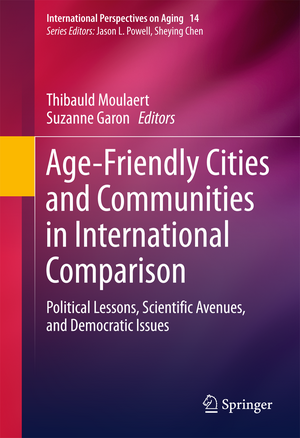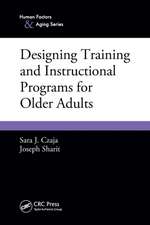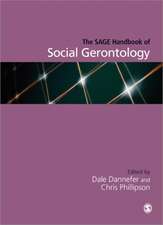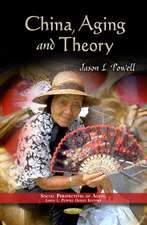Age-Friendly Cities and Communities in International Comparison: Political Lessons, Scientific Avenues, and Democratic Issues: International Perspectives on Aging, cartea 14
Editat de Thibauld Moulaert, Suzanne Garonen Limba Engleză Hardback – 21 ian 2016
The supportiverole of urban spaces in active aging is explored on a world scale in thisunique resource, using the WHO’s Age-Friendly Cities and Community model. Casestudies from the U.S., Canada, Australia, Hong Kong, and elsewhere demonstratehow the model translates to fit diverse social, political, and economic realitiesacross cultures and continents, ways age-friendly programs promote seniorempowerment, and how their value can be effectively assessed. Age-friendlycriteria for communities are defined and critiqued while extensive empiricaldata describe challenges as they affect elders globally and how environmentalsupport can help meet them. These chapters offer age-friendly cities as acorrective to the overemphasis on the medical aspects of elders’ lives, and shouldinspire new research, practice, and public policy.
Included in thecoverage:
“Given the rapid adoption ofthe age-friendly perspective, following its development by the World HealthOrganization, the critical assessment offered in this volume is especiallywelcome”.
Professor ChrisPhillipson, University of Manchester
Included in thecoverage:
- A critical review of the WHO Age-Friendly Cities Methodology and its implementation.
- Seniors’ perspectives on age-friendly communities.
- The implementation of age-friendly cities in three districts of Argentina.
- Age-friendly New York City: a case study.
- Toward an age-friendly European Union.
- Age-friendliness, childhood, and dementia: toward generationally intelligent environments.
“Given the rapid adoption ofthe age-friendly perspective, following its development by the World HealthOrganization, the critical assessment offered in this volume is especiallywelcome”.
Professor ChrisPhillipson, University of Manchester
| Toate formatele și edițiile | Preț | Express |
|---|---|---|
| Paperback (1) | 947.35 lei 43-57 zile | |
| Springer International Publishing – 30 mar 2018 | 947.35 lei 43-57 zile | |
| Hardback (1) | 953.35 lei 43-57 zile | |
| Springer International Publishing – 21 ian 2016 | 953.35 lei 43-57 zile |
Din seria International Perspectives on Aging
-
 Preț: 297.77 lei
Preț: 297.77 lei - 20%
 Preț: 567.78 lei
Preț: 567.78 lei - 18%
 Preț: 901.64 lei
Preț: 901.64 lei - 15%
 Preț: 631.07 lei
Preț: 631.07 lei - 20%
 Preț: 576.07 lei
Preț: 576.07 lei - 15%
 Preț: 646.11 lei
Preț: 646.11 lei -
 Preț: 392.37 lei
Preț: 392.37 lei - 15%
 Preț: 648.42 lei
Preț: 648.42 lei -
 Preț: 394.87 lei
Preț: 394.87 lei - 24%
 Preț: 694.69 lei
Preț: 694.69 lei - 15%
 Preț: 583.78 lei
Preț: 583.78 lei - 15%
 Preț: 698.94 lei
Preț: 698.94 lei -
 Preț: 446.37 lei
Preț: 446.37 lei - 18%
 Preț: 946.55 lei
Preț: 946.55 lei - 18%
 Preț: 785.42 lei
Preț: 785.42 lei - 15%
 Preț: 642.36 lei
Preț: 642.36 lei - 15%
 Preț: 582.80 lei
Preț: 582.80 lei - 18%
 Preț: 781.31 lei
Preț: 781.31 lei - 18%
 Preț: 889.29 lei
Preț: 889.29 lei - 18%
 Preț: 781.15 lei
Preț: 781.15 lei - 18%
 Preț: 1104.25 lei
Preț: 1104.25 lei - 15%
 Preț: 636.80 lei
Preț: 636.80 lei -
 Preț: 439.64 lei
Preț: 439.64 lei - 15%
 Preț: 473.49 lei
Preț: 473.49 lei - 24%
 Preț: 785.90 lei
Preț: 785.90 lei - 5%
 Preț: 1649.70 lei
Preț: 1649.70 lei - 18%
 Preț: 786.36 lei
Preț: 786.36 lei - 15%
 Preț: 651.99 lei
Preț: 651.99 lei
Preț: 953.35 lei
Preț vechi: 1162.61 lei
-18% Nou
Puncte Express: 1430
Preț estimativ în valută:
182.48€ • 198.28$ • 153.38£
182.48€ • 198.28$ • 153.38£
Carte tipărită la comandă
Livrare economică 21 aprilie-05 mai
Preluare comenzi: 021 569.72.76
Specificații
ISBN-13: 9783319240299
ISBN-10: 3319240293
Pagini: 337
Ilustrații: XV, 337 p. 14 illus. in color.
Dimensiuni: 155 x 235 x 24 mm
Greutate: 0.67 kg
Ediția:1st ed. 2016
Editura: Springer International Publishing
Colecția Springer
Seria International Perspectives on Aging
Locul publicării:Cham, Switzerland
ISBN-10: 3319240293
Pagini: 337
Ilustrații: XV, 337 p. 14 illus. in color.
Dimensiuni: 155 x 235 x 24 mm
Greutate: 0.67 kg
Ediția:1st ed. 2016
Editura: Springer International Publishing
Colecția Springer
Seria International Perspectives on Aging
Locul publicării:Cham, Switzerland
Public țintă
ResearchCuprins
The Challenges ofAging. – Population aging from a global and theoretical perspective. – Active Aging and Age-Friendly Cities: OneModel, Many Programs. – From the origins of AFC to the WHO global network. –Quebec: from research to policy from 7 pilot projects to 579 cities. – Sao Paulo:one action, three levels—state, city, and neighborhoods. – Hong Kong: thecentrality of participation. – Australia: proof of the “top-down” mistake. –France: is AFC brand new for French cities? Belgium/Wallonia: the limits of theWHO AFC model. – Waterloo, Ontario: AFC in action. – United States: when AFC isdeveloped further. – Manchester: is an urban perspective a means or an end? Challenges from and for Age-FriendlyCities. – Respecting the older subject: building AFC toward recognition. –The AFC model: between political economy and humanistic gerontology. – When AFCmeets policy. – Good and bad points about AFC. Conclusion
Notă biografică
Thibauld Moulaert, PhD is Associated professorat the Department of Social Work, University of Sherbrooke, Canada andpart-time Invited Professor at the Haute École de la Province de Namur (HEPN),Belgium. After a postdoctoral Fellowshipin sociology at the National Fund for Scientific Research, UniversitéCatholique de Louvain, including a Visiting Research at King’s College London,UK in 2010, he works as a scientific coordinator of a 3 years internationalproject for REAICTIS (Réseau d’Étude International sur l’Âge, la Citoyenneté etl’Intégration Socio-économique) on older people volunteering and on olderpeople citizenship and environments. His first book Governing the End of the Career at a Distance. Outplacement and ActiveAgeing in Employment (Peter Lang, 2012) received a prize for publicationfrom the Fondation Universitaire; in 2013, he co-edited,with Jean-PhilippeViriot Durandal , a special issue on New perspectives on ageing through the‘duty of ageing well’ for the international review Recherches sociologiques et anthropologiques.
14.00 Normal 0 false false false FR-BE X-NONE X-NONE
14.00 Normal 0 false false false FR-BE X-NONE X-NONE
Textul de pe ultima copertă
The supportive role of urban spaces in active aging is explored on a world scale in this unique resource, using the WHO’s Age-Friendly Cities and Community model. Case studies from the U.S., Canada, Australia, Hong Kong, and elsewhere demonstrate how the model translates to fit diverse social, political, and economic realities across cultures and continents, ways age-friendly programs promote senior empowerment, and how their value can be effectively assessed. Age-friendly criteria for communities are defined and critiqued while extensive empirical data describe challenges as they affect elders globally and how environmental support can help meet them. These chapters offer age-friendly cities as a corrective to the overemphasis on the medical aspects of elders’ lives, and should inspire new research, practice, and public policy.
Included in the coverage:
“Given the rapid adoption of the age-friendly perspective, following its development by the World Health Organization, the critical assessment offered in this volume is especially welcome”.
Professor Chris Phillipson, University of Manchester
Included in the coverage:
- A critical review of the WHO Age-Friendly Cities Methodology and its implementation.
- Seniors’ perspectives on age-friendly communities.
- The implementation of age-friendly cities in three districts of Argentina.
- Age-friendly New York City: a case study.
- Toward an age-friendly European Union.
- Age-friendliness, childhood, and dementia: toward generationally intelligent environments.
“Given the rapid adoption of the age-friendly perspective, following its development by the World Health Organization, the critical assessment offered in this volume is especially welcome”.
Professor Chris Phillipson, University of Manchester
Caracteristici
Includes supplementary material: sn.pub/extras







